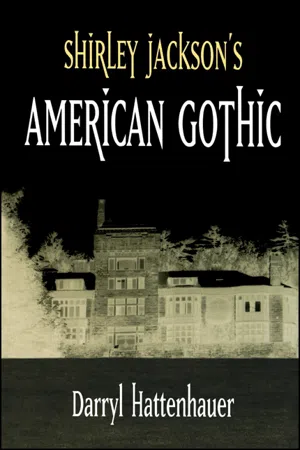
- 246 pages
- English
- PDF
- Available on iOS & Android
Shirley Jackson's American Gothic
About this book
Argues that Jackson's anticipation of postmodernism ranks her among the most significant writers of her time.
Best known for her short story "The Lottery" and her novel The Haunting of Hill House, Shirley Jackson produced a body of work that is more varied and complex than critics have realized. In fact, as Darryl Hattenhauer argues here, Jackson was one of the few writers to anticipate the transition from modernism to postmodernism, and therefore ranks among the most significant writers of her time. The first comprehensive study of all of Jackson's fiction, Shirley Jackson's American Gothic offers readers the chance not only to rediscover her work, but also to see how and why a major American writer was passed over for inclusion in the canon of American literature.
Frequently asked questions
- Essential is ideal for learners and professionals who enjoy exploring a wide range of subjects. Access the Essential Library with 800,000+ trusted titles and best-sellers across business, personal growth, and the humanities. Includes unlimited reading time and Standard Read Aloud voice.
- Complete: Perfect for advanced learners and researchers needing full, unrestricted access. Unlock 1.4M+ books across hundreds of subjects, including academic and specialized titles. The Complete Plan also includes advanced features like Premium Read Aloud and Research Assistant.
Please note we cannot support devices running on iOS 13 and Android 7 or earlier. Learn more about using the app.
Information
Table of contents
- Shirley Jackson’s American Gothic
- Contents
- Acknowledgments
- INTRODUCTION: Shirley Jackson and Proto-Postmodernism
- 1. Some Conditions of Production
- 2. The Lottery or, The Adventures of James Harris
- 3. Come Along with Me: Part of a Novel, Sixteen Stories, and Three Lectures
- 4. Just an Ordinary Day
- 5. The Road Through the Wall
- 6. Hangsaman
- 7. The Bird’s Nest
- 8. The Sundial
- 9. The Haunting of Hill House
- 10. We Have Always Lived in the Castle
- Afterword
- Notes
- Works Cited
- Index